七年级下unit12_what_did_you_do_last_weekend-period4课件
人教版七年级下册 Unit 12 What did you do last weekend? 知识点

七年级下册Unit 12 What did you do last weekend?知识点复习一、重点单词默写扎营______________湖泊_____________海滩_______________羽毛球______________绵羊_____________作为_______________自然的_______________蝴蝶____________游客_______________疲劳的_______________离开______________老鼠_______________幼小的_____________呼叫______________汪汪_____________语言_______________飞_____________风筝___________高的_______________以前___________帐篷_____________月亮_____________惊讶_____________蛇_____________惊慌的_____________移动_________________开始_______________跳跃_____________里面______________森林_____________停留_____________印度________________耳朵二、短语归纳去电影院叫醒去划船/露营去沙滩在星期六早上熬夜做某事放风筝冲……大声喊叫举起,张贴,搭建生活习惯看足球比赛再学一门语言生火往外看湖边扎营以……身份工作打羽毛球一点儿为考试学习如此多乐趣跑开带某人去某地冲……大声叫嚷(骂)使某人感觉……吃惊太……以至于上上下下让某人做某事三、重点语法1.感叹句What/How引导(一找主谓二判断形容词名词三判断名词单复数)①What an apple it is!What a fine day it is!What lovely animals they are!What nice music it is!②How clever the girl is!How fast he runs.选词填空。
七年级英语下册unit12_What_did_you_do_last_weekend
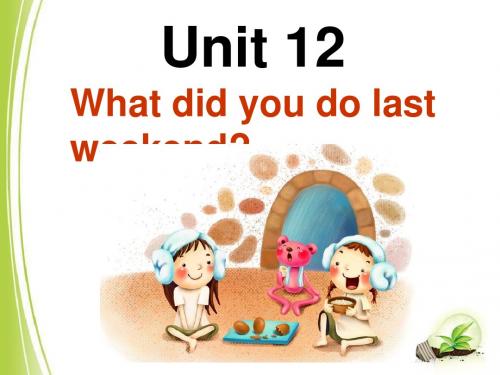
1. I worked as a guide at the Natural History Museum. 我在自然历史博物馆里做导游的工作。 “work as + 职业” 意为“做某工作”。 例如: Eric works as a music teacher in the club. 埃里克在那家俱乐部里做音乐老师的工作。 2.How interesting! 多么有趣啊! 这是一个感叹句,句子结构为: How + 形容词或副词 + (主语 + 谓语)! 例如:How interesting the book is! 那本书太有趣了! 3. stay up 意为“熬夜;深夜不眠” 。 例如: Don’t stay up late. It’s bad for your health. 不要熬夜,这对你的健康不好。
Who ____ did you go to the zoo _____? with 3.____ 你和谁一起去的动物园?
When ____ did they arrive in Beijing?他们什么时候到达北京的? 4._____
对下列句子中的划线部分提问。
1. I got up at nine yesterday morning. ______ ___ you get up yesterday morning? When did 2. We did our homework last night. _____ What ____ did you ___ do last night? 3. They were in the supermarket last Sunday. Where _____ were they last Sunday? _______ 4.My last weekend was kind of boring. How _____ was your last weekend? _____ 5.Linda took a walk with her parents after dinner. _____ Who ____ did Linda take a walk with after dinner?
人教版七年级英语下册Unit12-What-did-you-do-last-weekend

2c Student A asks questions with who,
what or where and Student B answers. Then change roles.
Who stayed at home Carol. I think. last weekend?
What did he do?
2a Listen and underline
the words you hear.
1. I visited my (aunt / _g_r_a_n_d_m__a). 2. I did my (h__o_m_e_w__o_rk_ / sports). 3. I studied for the (_E_n_g_l_is_h_/ math) test. 4. I went to a (_fa_r_m__/ beach). 5. I fed some (sheep / _c_o_w_s_).
tired
stay up
Read the conversation and answer
2d
the questions.
1. How was Lisa’s weekend? _It__w_a_s_g_r_e_a_t_. ___________
2. Where did Lisa work as a guide? _A_t_t_h_e__N_a_t_u_r_a_l _H_i_s_to_r_y__M__u_se_u_m__._
Well, on Saturday morning, I played badminton.
What did you do on Saturday afternoon?
I went to the beach.
七年级下Unit-12-What-did-you-do-last-weekend教案

七年级下册Unit 12 What did you do last weekend一、教学目标:1. 语言知识目标:1)掌握以下单词:camp, lake, beach, badminton, sheep, as, natural, butterfly, visitor, tired, stay, stay up late.能掌握以下句型:①—Where did you do last weekend, Lucy?—I went to summer camp.②—How was your weekend?—Pretty good, thanks③—I worked as a guide at the Natural History Museum.④—How interesting!2) 能了解以下语法:learn to talk about recent past events.◆短语归纳1. do my homework 做我的家庭作业2.go to the cinema 去电影院= go to the movies3. go boating / camping 去划船/ 去野营4. play badminton 打羽毛球5. on Saturday morning 在星期六早上6. work as 以……身份而工作7. have a good weekend 周末过得愉快8. kind of 有点儿9. stay up late 熬夜10. run away 跑开11. shout at 对……大声叫嚷12. fly a kite 放风筝13. high school 中学14. put up 搭起,举起15. in the countryside 在乡下16. get a surprise 吃惊17. make a fire 生火18. each other =one another互相19. so… that…如此……以至于……20. go to sleep 入睡21. the next morning 第二天早上22. look out of…向……外看23. shout to/at 冲……呼喊24. up and down 上上下下25. wake…up 把……弄醒26. over=more than 多于27.By the lake在湖边28.. a swimming pool 一个游泳池29.study for a test.备考30.under the moon在月亮下31.in the sun.在阳光下32.tell stories讲故事33.get/be lost 迷路34.a second language 另一种语言35.visit sb.拜访某人36.feed sheep喂养37.learn from 从...中获得38.in danger 处于危险中◆用法集萃1. go + doing 去做某事2. play + 球类玩……球3. 时间段+ ago ……前4. keep + sb. / sth. + 形容词/ 副词/ 介词短语使……保持……5. so + 形容词/ 副词+ that 句子如此……以至于……6. see sb. doing sth. 看见某人正在做某事7. let sb. do sth. 让某人做某事8. start to do / doing sth. 开始做某事9.finish doing sth。
初中英语七年级下册 Unit 12 What did you do last weekend.Sec

初中英语七年级下册 Unit 12 What did you do last weekend.SectionA(grammarfocus-3c)教学设计一. 教材分析本课是初中英语七年级下册Unit 12 What did you do last weekend的Section A (grammar focus-3c)。
本节课主要讨论一般过去时态,并通过询问过去的事情来培养学生的交际能力。
本节课的主要内容包括一般过去时态的构成 (主语+ didn’t +动词原形) 和回答 (主语 + did + 动词原形)。
本节课的词汇包括visit, write, watch, clean, cook等。
二. 学情分析七年级的学生已经掌握了基本的一般现在时态,对于一般过去时态的构成和用法有一定的了解,但还需要通过大量的练习来巩固和运用。
学生对于询问过去的事情感兴趣,可以通过生活经验来激发学生的学习兴趣和积极性。
三. 教学目标1.能听懂、会说、会读、会写一般过去时态的构成和用法。
2.能用一般过去时态描述自己和他人的过去行为。
3.能通过询问过去的事情,培养交际能力。
四. 教学重难点1.一般过去时态的构成和用法。
2.询问过去的事情,并用一般过去时态回答。
五. 教学方法1.交际法:通过模拟生活场景,让学生在实际语境中运用一般过去时态。
2.任务型教学法:通过完成各种任务,激发学生的学习兴趣和积极性。
3.情境教学法:通过创设情境,让学生在真实的环境中学习一般过去时态。
六. 教学准备1.教学课件:制作精美的课件,包括图片、视频、动画等,吸引学生的注意力。
2.教学材料:准备相关的生活场景图片、卡片等,用于模拟交际。
3.教学录音:录制相关的一般过去时态的对话,让学生听懂、会说。
七. 教学过程1.导入(5分钟)a.自由谈话:询问学生上周做了什么,引导学生用一般过去时态回答。
b.展示图片:展示一些与过去相关的图片,如上周的课堂活动、学生的家庭聚会等,激发学生的学习兴趣。
初中英语 七年级下册 Unit12 What did you do last weekend
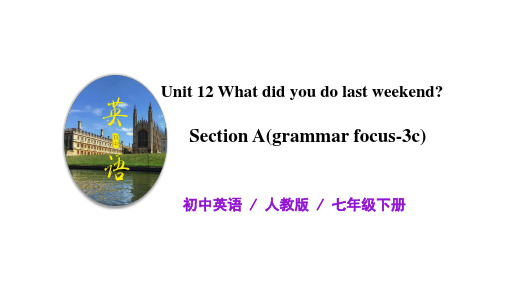
一般过去时的句式转换 1. 肯定句变否定句 (1)当句中含有情态动词 could, would, should
等时,可直接在情态动词后加 not。 You should go to the zoo first. You shouldn’t go to the zoo first.
3b Complete the passage with the correct forms
of the words in the box.
say be climb see run away
A family of mice were in the kitchen on Saturday morning when they __sa_w__ a big cat. Baby Mouse __w__a_s__ afraid and _c_li_m__b_e_d_ onto his father’s back.
(2) ① 昨天他做了什么事情? W__h_a_t_ _d_i_d_ he do yesterday?
② 上个周末她参观了什么地方? W__h_e_r_e_ _d_i_d_ she _v_i_si_t_ last weekend?
③ 你和谁一起去的动物园? _W__h_o_ _d_i_d_ you go to the zoo w__it_h_?
(2) 当句中含有 was/ were 时,可直接在was/ were 后加 not。 She was in the library yesterday. She wasn’t in the library yesterday.
(3)当句中的谓语动词是实义动词时,需在该动 词前加 didn’t,动词还原为原形。 She went to the park last week. She didn’t go to the park last week.
季七年级英语下册 Unit 12 What did you do last weekend课文重难点讲解(无答案)(新版)新人教版
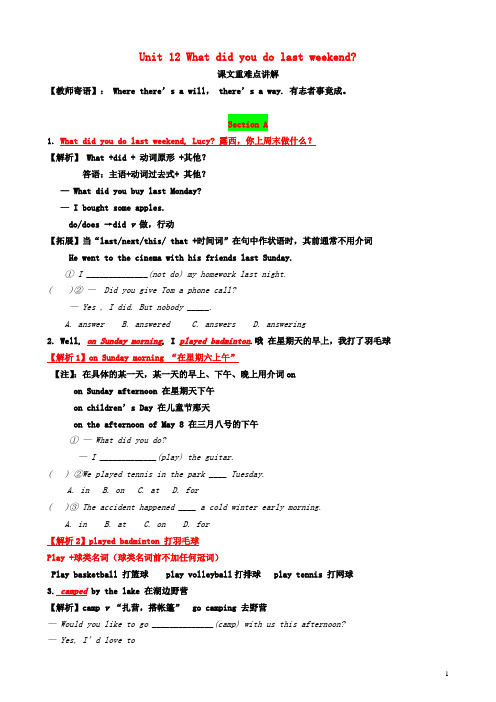
Unit 12 What did you do last weekend?课文重难点讲解【教师寄语】:Where there’s a will,there’s a way. 有志者事竟成。
Section A1. What did you do last weekend, Lucy? 露西,你上周末做什么?【解析】 What +did + 动词原形 +其他?答语:主语+动词过去式+ 其他?— What did you buy last Monday?— I bought some apples.do/does →did v 做,行动【拓展】当“last/next/this/ that +时间词”在句中作状语时,其前通常不用介词He went to the cinema with his friends last Sunday.① I ______________(not do) my homework last night.( )②—Did you give Tom a phone call?— Yes , I did. But nobody _____.A. answerB. answeredC. answersD. answering2. Well, on Sunday morning, I played badminton.哦在星期天的早上,我打了羽毛球【解析1】on Sunday morning “在星期六上午”【注】:在具体的某一天,某一天的早上、下午、晚上用介词onon Sunday afternoon 在星期天下午on children’s Day 在儿童节那天on the afternoon of May 8 在三月八号的下午①— What did you do?— I _____________(play) the guitar.( ) ②We played tennis in the park ____ Tuesday.A. inB. onC. atD. for( )③ The accident happened ____ a cold winter early morning.A. inB. atC. onD. for【解析2】played badminton 打羽毛球Play +球类名词(球类名词前不加任何冠词)Play basketball 打篮球 play volleyball打排球 play tennis 打网球3. camped by the lake 在湖边野营【解析】camp v“扎营,搭帐篷” go camping 去野营— Would you like to go ______________(camp) with us this afternoon?— Yes, I’d love to4. I studied for the math test. 我为数学测验而学习。
七年级英语下册Unit12Whatdidyoudolastweekend全部重要知识点(带答案)

七年级英语下册Unit12Whatdidyoudolastweekend全部重要知识点单选题1、I often laugh when I see my grandma learning pop songs. But she says,“One is never________old to learn.’’A.tooB.soC.veryD.quite答案:A句意:当我看到我的奶奶学习流行歌曲时,我经常笑。
但她说:“活到老学到老。
”考查副词辨析。
too太;so如此;very非常;quite十分。
本句是“too…to”结构,表示“太……而不能”,否定意义;根据句意语境,可知选A。
2、What ________ news it is! Everyone is ________ because they can get the tickets to the basketball match for free on the Internet.A.surprise; surprisedB.surprising; surprisedC.surprised; surprisingD.surprising; surprise答案:B句意:这是多么令人惊讶的消息啊!每个人都很惊讶,因为他们可以在网上免费获得篮球比赛的门票。
考查形容词的用法。
surprise意想不到(或突然)的事,令人惊奇的事;surprised惊讶的;surprising令人吃惊的。
根据“What…news it is! ”可知,本句为感叹句,使用形容词surprising作定语修饰名词news;根据“Everyone is”可知,此处描述人的感受,使用形容词surprised作表语。
故选B。
3、I like this song. It’s by one of my favorite_________.A.singersB.dancersC.paintersD.writers答案:A句意:我喜欢这首歌,它是我最喜欢的歌手之一唱的。
2019人教版七下Unit12 What did you do last weekend 重点知识归纳
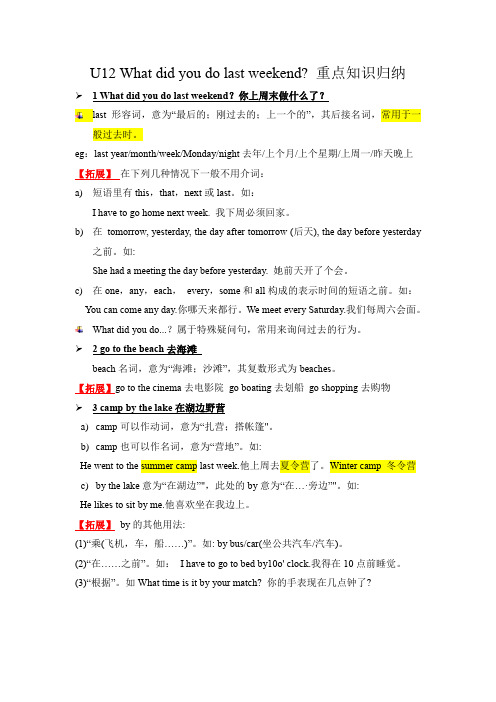
U12 What did you do last weekend? 重点知识归纳1 What did you do last weekend?你上周末做什么了?last形容词,意为“最后的;刚过去的;上一个的”,其后接名词,常用于一般过去时。
eg:last year/month/week/Monday/night去年/上个月/上个星期/上周一/昨天晚上【拓展】在下列几种情况下一般不用介词:a)短语里有this,that,next或last。
如:I have to go home next week. 我下周必须回家。
b)在tomorrow, yesterday, the day after tomorrow (后天), the day before yesterday之前。
如:She had a meeting the day before yesterday. 她前天开了个会。
c)在one,any,each,every,some和all构成的表示时间的短语之前。
如:You can come any day.你哪天来都行。
We meet every Saturday.我们每周六会面。
What did you do...?属于特殊疑问句,常用来询问过去的行为。
2 go to the beach去海滩beach名词,意为“海滩;沙滩”,其复数形式为beaches。
【拓展】go to the cinema去电影院go boating去划船go shopping去购物3 camp by the lake在湖边野营a)camp可以作动词,意为“扎营;搭帐篷"。
b)camp也可以作名词,意为“营地”。
如:He went to the summer camp last week.他上周去夏令营了。
Winter camp 冬令营c)by the lake意为“在湖边”",此处的by意为“在…·旁边”"。
七年级英语下册Unit12Whatdidyoudolastweekend重点解析素材

Unit 12 What did you do last weekend重点解析Section A1. I fed some sheep.我喂了一些羊。
sheep是可数名词,意为“羊;绵羊”。
它的单复数形式相同,类似的单词还有Chinese (中国人)、Japanese (日本人)、deer (鹿)等。
如:Three sheep are eating grass in the field.三只羊正在地里吃草。
2. I worked as a guide at the Natural History Museum.我在自然历史博物馆当导游。
★as在这里作介词,意为“作为;当作”。
如:You can use this box as a pencil-box.你可以用这个盒子作为铅笔盒。
★guide在这里作名词,意为“导游;向导”。
如:A guide will show us around the place. 一位导游将带我们参观这个地方。
★natural作形容词,意为“自然的;天然的”。
其名词形式是nature,意为“自然;大自然”。
如:It is natural for you to say thanks to him.你自然要向他道谢。
There are many kinds of animals in the nature. 大自然中有许多种动物。
3. I stayed up late to watch the soccer game. 我熬夜到很晚看足球比赛。
★stay up 意为“深夜不睡;熬夜”。
stay up late是指“熬夜到很晚”。
如:You have to go to school tomorrow. Don't stay up too late. 你明天要上学,不要熬夜到太晚。
★stay意为“停留;待”。
如:We'll stay at home this weekend.这个周末我们将待在家里。
Unit-12-What-did-you-do-last-weekend知识点总结
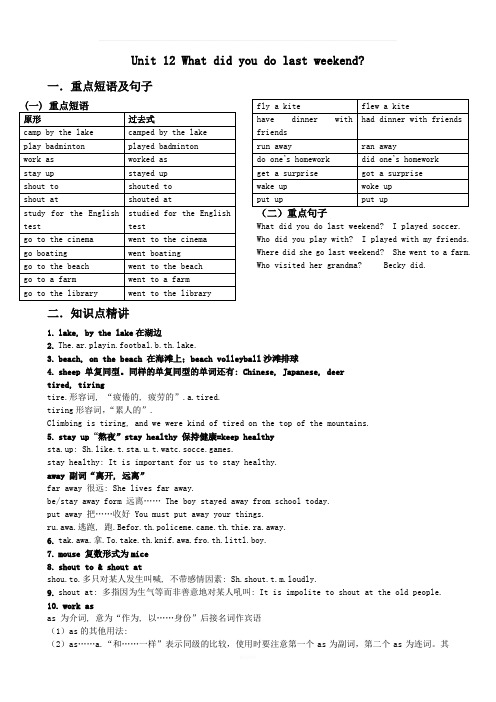
Unit 12 What did you do last weekend? 一.重点短语及句子What did you do last weekend? I played soccer.Who did you play with? I played with my friends.Where did she go last weekend? She went to a farm.Who visited her grandma? Becky did.二.知识点精讲ke, by the lake在湖边ke.3.beach, on the beach 在海滩上;beach volleyball沙滩排球4.sheep 单复同型。
同样的单复同型的单词还有: Chinese, Japanese, deertired, tiringtire.形容词, “疲倦的, 疲劳的”.a.tired.tiring形容词,“累人的”.Climbing is tiring, and we were kind of tired on the top of the mountains.5.stay up “熬夜”stay healthy 保持健康=keep healthysta.up: Sh.like.t.sta.u.t.watc.socce.games.stay healthy: It is important for us to stay healthy.away 副词“离开, 远离”far away 很远: She lives far away.be/stay away form 远离…… The boy stayed away from school today.put away 把……收好 You must put away your things.ru.awa.逃跑, 跑.Befor.th.policeme.came.th.thie.ra.away.6.tak.awa.拿.To.take.th.knif.awa.fro.th.littl.boy.7.mouse 复数形式为mice8.shout to & shout atshou.to.多只对某人发生叫喊, 不带感情因素: Sh.shout.t.m.loudly.9.shout at: 多指因为生气等而非善意地对某人吼叫: It is impolite to shout at the old people.10.work asas 为介词, 意为“作为, 以……身份”后接名词作宾语(1)as的其他用法:(2)as……a.“和……一样”表示同级的比较,使用时要注意第一个as为副词,第二个as为连词。
七年级英语下册 Unit 12 What did you do last weeken

基础知识回顾
Ⅰ.汉译英 1.放风筝 fly a kite 2.去野营 go camping 3.有趣的事 anything/something interesting 4.打羽毛球 play badminton 5.熬夜 stay up late
.
A.wasn’t B.doesn’t
C.does
D.didn’t
( A )5.There are lots of
and
in the village.
A.mice;sheep B.mice;sheeps
C.mouses;sheep D.mouses;sheeps
about you?
We went shopping on Sunday afternoon.
4.上个月玲玲和她的妈妈是坐火车去北京的。
Lingling and her mother went to Beijing by train last month.
5.上周末你和你的朋友去哪里了?
Where did you go with your friend last weekend?
基础知识回顾
Ⅲ.根据汉语意思完成句子,每空一词
1.上周末我和弟弟放风筝了。
I flew a kite with my brother last weekend. 2.上周六我去了动物园。你呢?
I went to the zoo last Saturday. How/What 3.星期天下午我们去购物了。
综合能力提升
Ⅰ.单项填空
( B )1.They sang and played
guitar yesterday afternoon.
七年级英语下册 Unit 12 What did you do last weeken
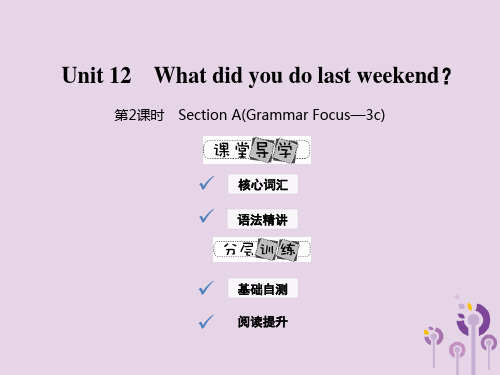
第2课时 Section A(Grammar Focus—3c)
核心词汇 语法精讲
基础自测 阅读提升
1.离开;远离 adv._a_w_a_y_ 2.老鼠;耗子 n._m__o_u_s_e_ 3.幼儿的 adj.婴儿 n.__b_ab_y__ 4.呼叫;喊叫 v._s_h_o_u_t_ 5.语言 n.__la_n_g_u_a_g_e_ 6.跑开 _r_u_n___aw__a_y_ 7.冲……大声叫嚷 _s_h_o_u_t__a_t…___ 8.去划船 _g_o__b_o_a_t_in_g__ 9.打羽毛球 _p_l_a_y__b_a_d_m__in_t_o_n_ 10.去海滩 _g_o___to___th_e___b_e_ac_h__
② 实义动词: 特殊疑问词+助动词did+主语+动词原形+其他?如: What did Mike do yesterday afternoon? 昨天下午迈克做了什么? When did Tony start to play the guitar? 托尼什么时候开始弹吉他的? 2.巧记不规则动词的过去式:
Ⅰ.用适当的特殊疑问词填空。 1.—_W__h_o_ lost his keys yesterday? —David did. 2.—_H__o_w_ was your school trip? —It was great. 3.—_W__h_a_t_ did they do on the farm? —They fed cows. 4.—_W__h_e_n_ was he in Beijing? —Yesterday. 5.—_W__h_e_r_e_ did they go? —They went to the park.
- 1、下载文档前请自行甄别文档内容的完整性,平台不提供额外的编辑、内容补充、找答案等附加服务。
- 2、"仅部分预览"的文档,不可在线预览部分如存在完整性等问题,可反馈申请退款(可完整预览的文档不适用该条件!)。
- 3、如文档侵犯您的权益,请联系客服反馈,我们会尽快为您处理(人工客服工作时间:9:00-18:30)。
Paragraph 2
Paragraph 3
(Read the passage again for 5 mins)
找关键词,抓住细节。
Paragraph 2: 1. How did they get to the village?
They took a long bus ride to a lake/went there by bus. 2. What did they do in the village? They put up their tents and made a fire to keep warm and cook food on.At night, they just sat under the moon and told each other stories.
It was interesting but scary.
Fast reading:速读文章,抓关键信息
A Weekend to Remember
Paragraph 1
A: We camped in a small village and we did many things on the first day. B: My sister and I got a terrible surprise the next morning and I learned a useful lesson. C: Our parents took us to India last weekend and it was interesting but scary.
A weekend to remember
杨家套中学 马海英
1.What did you do last weekend?
2.Did you have a good time?
Do you want to go camping? = camp
Q1: Where do you want to go camping?
beach, mountain, by the lake…
Q2: What can you take with you?
food, tent, mobile phone…
Q3: What do you need to do?
put(put) up the tent
keep warm make(made) a fire
3. Why did Lisa go to sleep early? Because she was so tired that she went to sleep early.
Paragraph 3: Read and circle T for true or F for false . 1)1.Lisa and her sister didn’t know how to make the snake go away. (T F) 2.Lisa’s dad jumped up and down because he was scared, too.(T F) 3.Snakes don’t really hear things like people do. (T F) 4.Lisa didn’t think it was a very important to go near a snake. (T F)
A.整理本节课重点短语和句子。
B.以My Last Weekend为题根据提示写一篇50词左右 的文章。开头已给出。上周末我去了博物馆,我对 那些东西不感兴趣。突然我发现拐角处有一个女孩 在哭。她找不到她的妈妈了。我帮助她找到了家人。 感觉很开心。(提示词go to the museum;too many people;at the corner在拐角处;suddenly突然地)
After reading:
Put the phrases in order accoring to the passage .Then use them to retell the story. 6 snake went into the forest ___ 2 put up our tents and cooked food ___ ___ 8 learned a useful lesson ___ 4 saw a snake and shouted to parents for help 7 __snakes can’t hear but they can feel things moving ___ 5 my dad jumped up and down in his tent ___ 1 took a bus to a small village in India ___ 3 told stories under the moon, then went to sleep
Listen to a part of story, and finish the exercises. 1. 选择填空: B . Lisa's parents took them to______ A. England B. India C. China
2. 回答问题: How was Lisa’s last weekend?
I can say…
小组成员每人一句,每说出一个句子加1分。对抗组 负责记分。其它组成员认真听,发现并能指出表演
者错误的,双倍加分。
two weeks ago;interesting but scary;went
camping;put up;make a fire;told stories;shout
cook food on it
I can see a snake moving on the grass. I’m so scared that I can’t move. Shout to others Jump up and down
It ‘s important not to go near a snake.ul lesson…
Test:
Lisahad (have) a trip to India as a gift last weekend. Theywent (go) camping(camp) in a small village in India. There they put (put) up their tent and made(make) a fireto keep (keep) us warm and cook food on. Lisawas (be) so tired that she went to sleep early. The next morning, when they got (get) up, they saw (see) a big snake sleeping (sleep) near the fire. Her father (jump) up and down and woke (wake) the snake up. Finally, the snake moved (move) into the forest.
